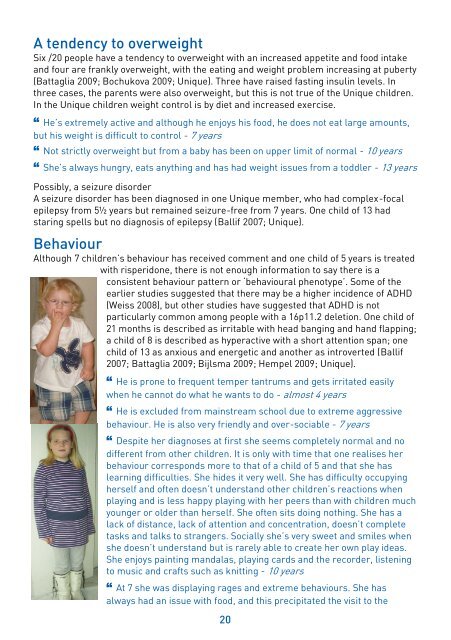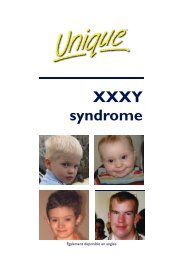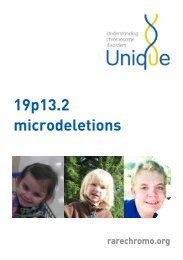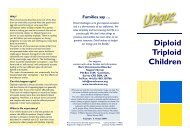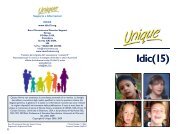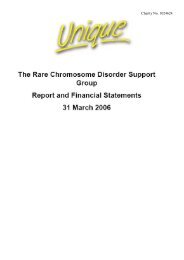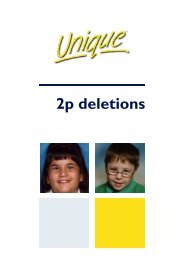16p11.2 microdeletions - Unique - The Rare Chromosome Disorder ...
16p11.2 microdeletions - Unique - The Rare Chromosome Disorder ...
16p11.2 microdeletions - Unique - The Rare Chromosome Disorder ...
Create successful ePaper yourself
Turn your PDF publications into a flip-book with our unique Google optimized e-Paper software.
A tendency to overweight<br />
Six /20 people have a tendency to overweight with an increased appetite and food intake<br />
and four are frankly overweight, with the eating and weight problem increasing at puberty<br />
(Battaglia 2009; Bochukova 2009; <strong>Unique</strong>). Three have raised fasting insulin levels. In<br />
three cases, the parents were also overweight, but this is not true of the <strong>Unique</strong> children.<br />
In the <strong>Unique</strong> children weight control is by diet and increased exercise.<br />
“ He’s extremely active and although he enjoys his food, he does not eat large amounts,<br />
but his weight is difficult to control - 7 years<br />
“ Not strictly overweight but from a baby has been on upper limit of normal - 10 years<br />
“ She’s always hungry, eats anything and has had weight issues from a toddler - 13 years<br />
Possibly, a seizure disorder<br />
A seizure disorder has been diagnosed in one <strong>Unique</strong> member, who had complex-focal<br />
epilepsy from 5½ years but remained seizure-free from 7 years. One child of 13 had<br />
staring spells but no diagnosis of epilepsy (Ballif 2007; <strong>Unique</strong>).<br />
Behaviour<br />
Although 7 children’s behaviour has received comment and one child of 5 years is treated<br />
with risperidone, there is not enough information to say there is a<br />
consistent behaviour pattern or ‘behavioural phenotype’. Some of the<br />
earlier studies suggested that there may be a higher incidence of ADHD<br />
(Weiss 2008), but other studies have suggested that ADHD is not<br />
particularly common among people with a <strong>16p11.2</strong> deletion. One child of<br />
21 months is described as irritable with head banging and hand flapping;<br />
a child of 8 is described as hyperactive with a short attention span; one<br />
child of 13 as anxious and energetic and another as introverted (Ballif<br />
2007; Battaglia 2009; Bijlsma 2009; Hempel 2009; <strong>Unique</strong>).<br />
“ He is prone to frequent temper tantrums and gets irritated easily<br />
when he cannot do what he wants to do - almost 4 years<br />
“ He is excluded from mainstream school due to extreme aggressive<br />
behaviour. He is also very friendly and over-sociable - 7 years<br />
“ Despite her diagnoses at first she seems completely normal and no<br />
different from other children. It is only with time that one realises her<br />
behaviour corresponds more to that of a child of 5 and that she has<br />
learning difficulties. She hides it very well. She has difficulty occupying<br />
herself and often doesn’t understand other children’s reactions when<br />
playing and is less happy playing with her peers than with children much<br />
younger or older than herself. She often sits doing nothing. She has a<br />
lack of distance, lack of attention and concentration, doesn’t complete<br />
tasks and talks to strangers. Socially she’s very sweet and smiles when<br />
she doesn’t understand but is rarely able to create her own play ideas.<br />
She enjoys painting mandalas, playing cards and the recorder, listening<br />
to music and crafts such as knitting - 10 years<br />
“ At 7 she was displaying rages and extreme behaviours. She has<br />
always had an issue with food, and this precipitated the visit to the<br />
20


